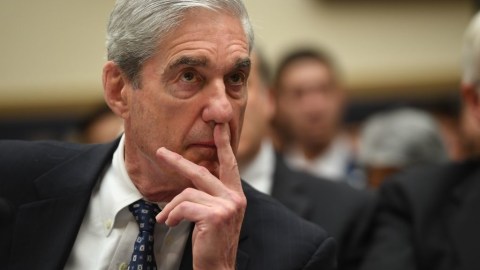Mueller testimony raises disagreement over ‘collusion’ and ‘conspiracy’

Saul Loeb/Getty
- In a tense exchange between former special counsel Robert S. Mueller III and Rep. Douglas A. Collins, Mueller seemed to contradict himself on what these two words mean.
- The Mueller report states that, as defined in legal dictionaries, conspiracy and collusion are largely synonymous.
- Mueller is also scheduled to testify before the House Intelligence Committee later on Wednesday.
Former special counsel Robert S. Mueller III testified before the House Judiciary Committee on Wednesday over his report on potential obstruction of justice by President Donald Trump.
Members of Congress questioned Mueller over a variety of topics covered in his 448-page report. Democrats mostly quoted lines from the report that highlight the president’s apparent attempts to have Mueller fired, while Republicans accused Mueller of unfairly conducting his investigation and hiring prosecutors with anti-Trump bias onto his team.
Mueller responded tersely to both sides, but especially to Republicans – dozens of times Mueller declined to answer questions, referring them simply to the “language of the report.” But despite the overall lack of revelations, one tense exchange did raise some questions over the definitions of two keywords featured in Mueller’s report: collusion and conspiracy.
Seeking to reaffirm that the Mueller report didn’t find evidence that Trump committed crimes, Rep. Douglas A. Collins, the panel’s ranking Republican, asked Mueller about a section of his report that said, “collusion is largely synonymous with conspiracy.”
“Collusion is not a specific offense – and you’ve said that this morning – or a term of art in the federal criminal law. Conspiracy is,” Collins said at a fast pace, reading from Mueller’s report.
“Yes,” Mueller agreed.
“In the colloquial context, known public context, collusion and conspiracy are essentially synonymous terms, correct?” Collins asked.
“No,” Mueller said.
Collins seems to be trying to discredit Mueller by asking him gotcha questions about his own report pic.twitter.com/jpfkD7QO7X
— Aaron Rupar (@atrupar) July 24, 2019
Collins then cited a page of Mueller’s report that seems to contradict that – specifically, a section that says “as defined in legal dictionaries, collusion is largely synonymous with conspiracy.”
“You said at your May 29 press conference, and here today, you choose your words carefully. Are you sitting here today testifying something different than what your report states?” Collins asked.
Flustered, Mueller asked Collins for a citation from the report.
“You stated that you would stay within the report. I just stated your report back to you and you said that collusion and conspiracy were not synonymous terms,” Collins said. “You said you chose your words carefully. Are you contradicting that report right now?”
“Not when I read it,” Mueller said.
“So, you would change your answer to ‘yes’ then?” Collins asked.
“No, no. If you look at the language…” Mueller trailed off, eventually saying he leaves his answer “with the report.”
Why did Mueller appear to contradict his own report? One reason might be because it was a stressful situation and Collins, by his own admission, tends to speak quickly. Another reason might be because Collins asked about the sameness of conspiracy and collusion in the “colloquial” sense, while the report said “as defined in legal dictionaries.” Still another reason could be that Mueller’s team chose to use the term “coordination” instead of collusion in the report to refer to potential illegal activities with Russians. (Collusion, by the way, doesn’t refer to a federal crime, even though the term has been ubiquitous in the years-long conversation surrounding the Mueller report.)
The exchange came off as a “gotcha” moment that seemed to throw Mueller off balance. In any case, Collins seemed to want a highlight the key bit of the Mueller report:
“…the investigation did not establish that members of the Trump Campaign conspired or coordinated with the Russian government in its election interference activities.”
In other words, Republicans wanted to reiterate one of the president’s favorite refrains: “NO COLLUSION!”





